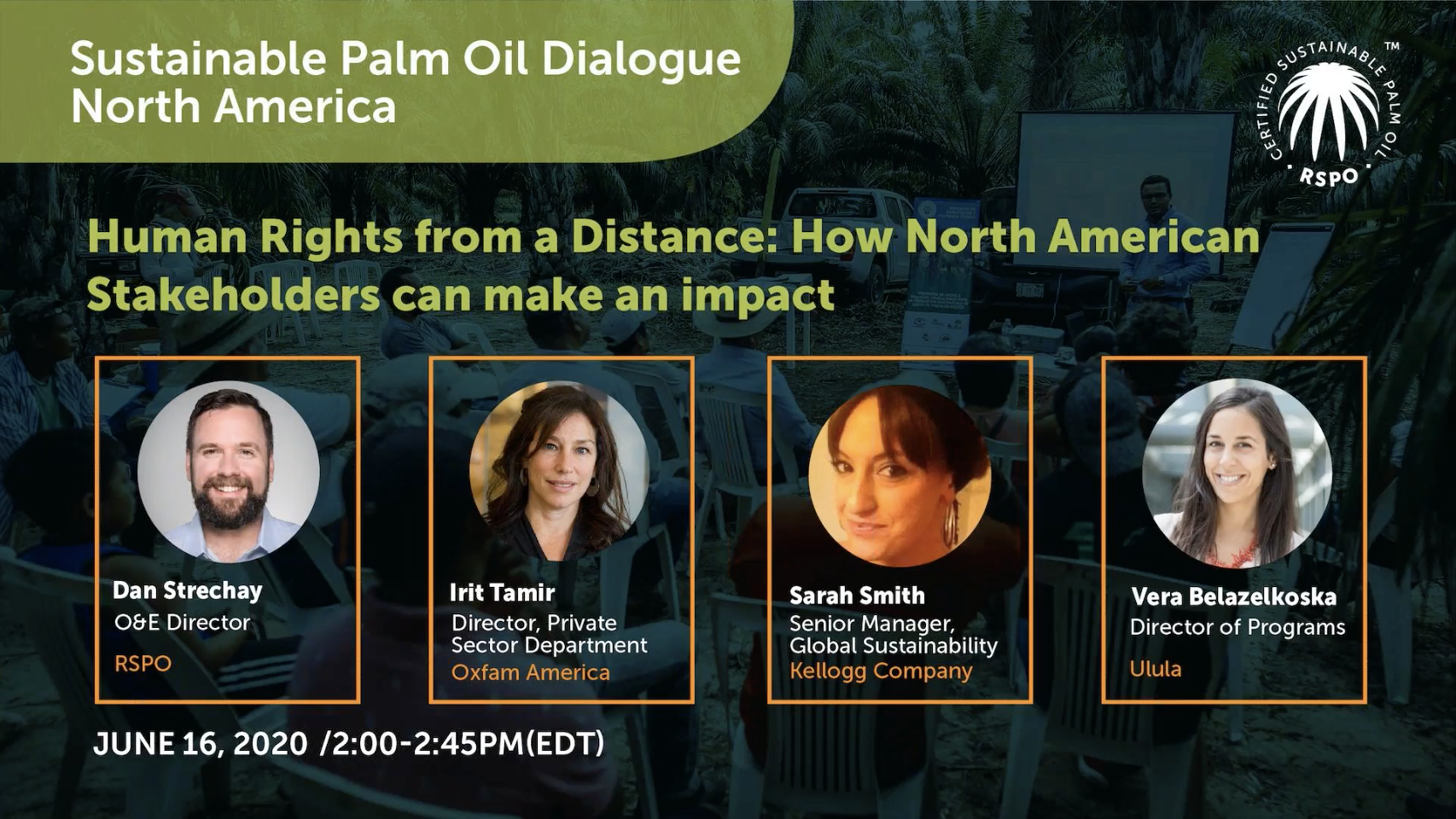Last June, the Roundtable on Sustainable Palm Oil (RSPO) convened a discussion on Human Rights from a Distance: How can North American players impact human rights in the palm sector during the North America Sustainable Palm Oil Dialogue 2020. Moderated by Dan Strechay from RSPO, the panel brought together Irit Tamir from Oxfam US, Sarah Smith from Kellogg Company, and Vera Belzelkoska from Ulula for a discussion on the importance of pursuing a multi-stakeholder approach to addressing systemic social and labor challenges within supply chains. The panelists also shared tips on how companies, large and small, can get started on this journey of digitally engaging with ground-level workers to build resilient supply chains and communities in a post-COVID-19 context.
Listening to workers and communities to improve human rights impacts
To effectively drive human rights improvements within supply chains, companies need to take a multi-stakeholder approach that engages workers and communities. “Human rights violations are often a result of power imbalances.” says Irit Tamir from Oxfam, “North American companies have a whole lot of power to have a positive impact on affected communities and the ability to empower people in supply chains. Include workers and farmers that want to work with you”. By capturing the needs and voices of palm oil farmers and local communities, companies get direct feedback regarding labour conditions, fair wages, and operational impacts as a result of disease outbreaks, all of which can compromise business continuity when escalated. Ground-level insights captured through a bottom-up approach help companies identify and address systemic supply chain issues at the source and support workforce and business resilience.
Digital tools help you engage with on-the-ground workers at scale
Travel restrictions resulting from the COVID-19 pandemic have made it difficult to conduct in-person audits and site visits, prompting companies to explore digital tools to conduct remote assessments and alternative means of engaging with stakeholders. “Today more than ever, technology can facilitate greater closeness between different entities that help amplify stakeholder voices across the globe,” says Vera Belazelkoska. Real-time stakeholder engagement technology can help companies get ground-level insights on disease outbreaks and their operational impacts and disruptions for early risk detection and remediation.
Four steps to get started on engaging stakeholders
“Getting that community voice is extremely important,” says Sarah Smith from Kellogg, “we want to make sure that the tools that we’re using aren’t just benefiting us but also protecting the environment and improving livelihoods and lives throughout the supply chain”.
- Do a self-assessment. Each company is at a different point in their journey. Stakeholder engagement technology may not be the right tools for companies that haven’t yet traced their supply chains. There are many international and local organizations that can help guide you in the gap analysis or needs assessment.
- Identify internal cross-functional champions who can make a strong business case for stakeholder engagement tools using language that will resonate with key decision makers across legal, procurement, and human resources departments.
- Take a multi-stakeholder approach to human rights management and stakeholder engagement. Tackling systemic challenges within supply chains requires collaboration with other companies, NGOs, civil society, investors, and input from ground-level stakeholders most affected by your organization’s activities.
- Get support from technology providers and industry experts. Don’t be afraid to trial different tools and frameworks via short-term pilot projects until you find one that helps you address social, environmental and labor risks specific to the context of the regions where you operate.
Ulula is a social enterprise that equips organizations with technology, data and analytics to monitor workplace safety, encourage community engagement, and human rights compliance in order to create more responsible supply chains. With over one million stakeholders engaged in over 30 countries worldwide, Ulula’s technology helps companies detect, mitigate and prevent labor, operational and environmental risks across sectors. Contact vera@ulula.com to learn more about how Ulula is supporting organizations in the palm sector advance on social and human rights indicators.

